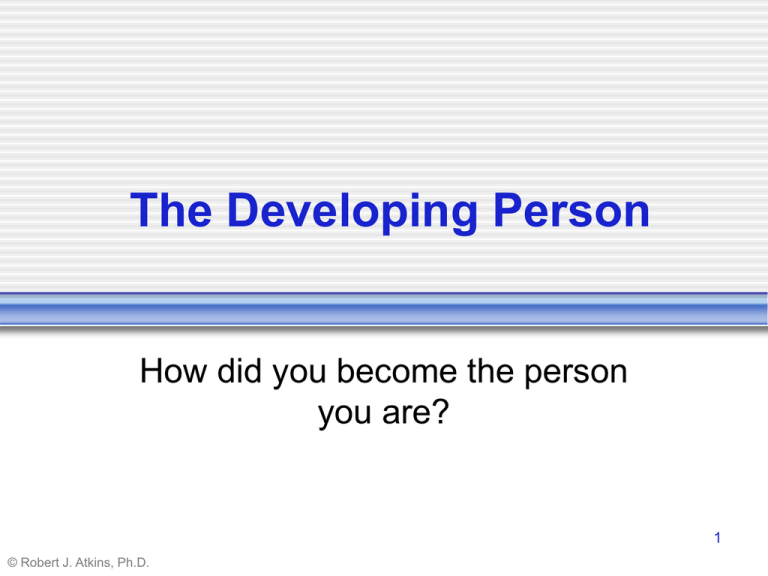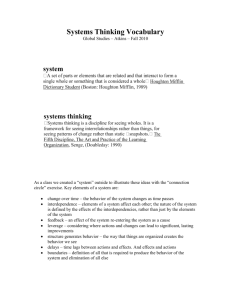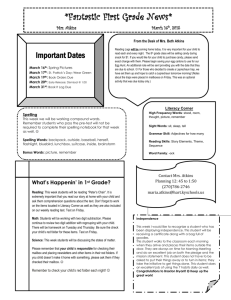The Developing Person How did you become the person you are? 1
advertisement

The Developing Person How did you become the person you are? 1 © Robert J. Atkins, Ph.D. 2 © Robert J. Atkins, Ph.D. Cognitive Development • Jean Piaget Sensorimotor (0-2 years) Object Permanence Preoperational (2-7 years) Conservation of Matter Egocentric Concrete operations (7-12 years) Concrete objects Formal operations (12 to adult) Abstract thought “What if?” questions can be considered © Robert J. Atkins, Ph.D. 3 Social Development • How did you develop social bonds? Body contact Familiarity Self Concept Parenting 4 © Robert J. Atkins, Ph.D. Body contact • Harlow monkey studies • Wire mother & terrycloth mother Preferred non-nourishing cloth mother 5 © Robert J. Atkins, Ph.D. Familiarity • Critical period • Imprinting Birds forming attachment during the critical period 6 © Robert J. Atkins, Ph.D. Self concept • Children with a positive self concept are more sociable. 7 © Robert J. Atkins, Ph.D. Do you remember? • What were Piaget’s stages of development? • What did the Harlow monkey studies tell us abut body contact? • Can you give an example of imprinting? • What helps to make a child more sociable? 8 © Robert J. Atkins, Ph.D. Parental attachment • Toddlers with secure attachments to parents: More sociable More enthusiastic and persistent in tackling challenging tasks. 9 © Robert J. Atkins, Ph.D. Parenting • Authoritarian Impose rules & expect obedience • Permissive Go along with child’s desires • Authoritative Discusses and negotiates rules Produce more self-confident children 10 © Robert J. Atkins, Ph.D. Moral Development • Kohlberg - Moral development • Preconventional Obey to gain rewards or avoid punishment • Conventional Respect for laws and rules simply because they are there • Postconventional Abstract reasoning-rights and ethics 11 © Robert J. Atkins, Ph.D. Erickson’s eight stages of Psychosocial Development • • • • 1. Infancy = Trust vs mistrust 2. Toddler = Autonomy vs Shame & doubt 3. Preschooler = Initiative vs guilt 4. Elementary school = Competence vs inferiority 5. Adolescence = Identity vs. role confusion • 6. Young adult = Intimacy vs. isolation • 7. Middle adult = Generativity vs. stagnation • 8. Late adulthood = Integrity vs. despair Integrity achieved in late adulthood One’s life has been meaningful © Robert J. Atkins, Ph.D. 12 Do you remember • What types of parenting are there? What one produces the most selfconfident children? • What were Kohlberg’s stages of moral development? Can you give an example of each? • What were Erikson’s eight stages of psychosocial development? 13 © Robert J. Atkins, Ph.D. How does aging effect Intelligence? • Crystallized intelligence Accumulated knowledge • E.g. State capitals Increases with age • Fluid intelligence Abstract reasoning and the ability solve problems decreases with age. E.g. Learning new computer program 14 © Robert J. Atkins, Ph.D. How does aging effect Alzheimer’s? • Alzheimer’s disease Deterioration of the brain Effects memory and thinking Difficulty in naming familiar objects or people Linked to genetic abnormalities Linked to activity (Use it or lose it) 15 © Robert J. Atkins, Ph.D. How does society effect what we do as we age? • The “social clock” The feeling that events in life regularly occur at specific ages. Graduation, marriage, children, retirement, etc. Varies greatly from culture to culture No biological basis for timing of events 16 © Robert J. Atkins, Ph.D. Love • John Gottman: Best predictor of marital satisfaction is the ratio of positive to negative interactions with each other. 17 © Robert J. Atkins, Ph.D. Do you remember • What is the difference between crystallized and fluid intelligence? Can you give an example? • What are the symptoms of Alzheimer’s? • How does the “social clock” effect you? • According to Gottman, what is the best predictor of marital satisfaction? 18 © Robert J. Atkins, Ph.D. 19 © Robert J. Atkins, Ph.D.




